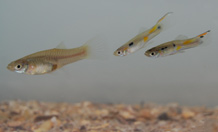
Two male guppies harrass a female. Image: Dr Darren Croft, University of Exeter.
Female fish choose attractive friends to avoid attention
Scientists have observed a strategy for females to avoid unwanted male attention: choosing more attractive friends.
Published in the journal Proceedings of the Royal Society B, the study is the first to show females spending time with those more sexually attractive than themselves to reduce harassment from males.
Carried out by the Universities of Exeter and Copenhagen, the study focuses on the Trinidadian guppy, a species of small freshwater fish. It shows that the females choose companions that are relatively more attractive than themselves and in this way reduce harassment from males. The research shows that the tactic is successful and by ensuring they are less attractive than other group members, the fish experience less harassment and fewer mating attempts from males.
Male guppies are well known for frequent and sometimes constant harassment of females. This puts a significant burden on females, sometimes preventing them finding food and escaping from predators.
Females are ‘receptive’ for a few days in each month. During this time they emit a sexual pheromone that attracts males and allow males to glide into a position that facilitates mating.
The researchers used guppies descended from those living in the Aripo River in Trinidad. They identified which females were currently receptive to male sexual attention and which were not. They then monitored the amount of time both receptive and non-receptive females chose to spend with either receptive or non-receptive females.
They found that non-receptive females spent significantly more time with receptive, and therefore more sexually attractive, females and that, by doing so, they received far less attention from males. In fact, they even chose water in which receptive females had recently swum over water that had housed other non-receptive fish. This shows they picked up on chemical cues emitted by receptive females and found this to create a more appealing social environment.
Lead researcher Dr Safi Darden, a psychologist from the Centre for Research in Animal Behaviour at the University of Exeter said: “It is now becoming apparent that males of some species choose to associate with relatively less attractive males to increase their chances of mating. We wanted to see if females also chose their same-sex companions based on attractiveness, but in this case, to reduce unwanted attention.
“Our results support the idea that social structure can develop around relative attractiveness and mating strategies. Although we focused our study on one species of fish, I would expect that this strategy would be seen in other species where females face similar levels of unwanted sexual attention from males.”
This research was funded by a Leverhulme Trust Early Career Fellowship and the Oticon Foundation.
Date: 7 December 2011
